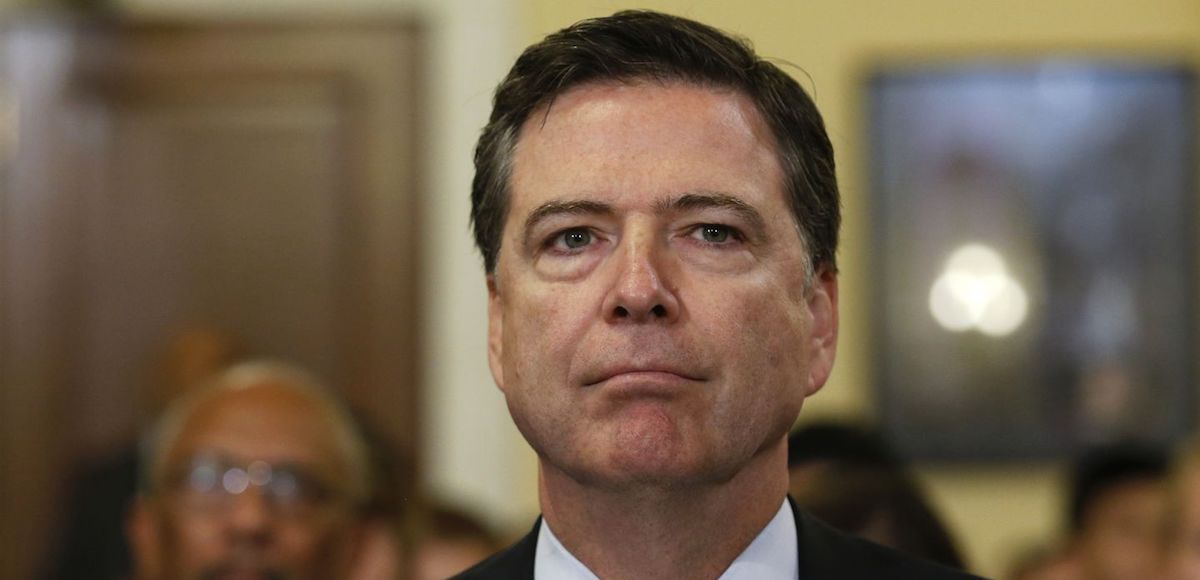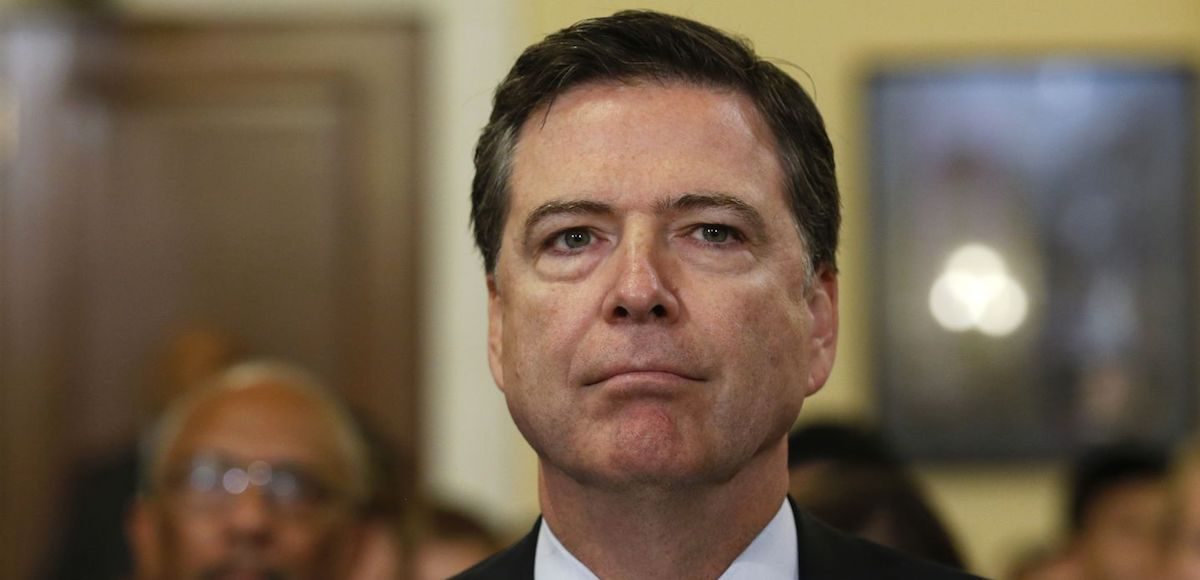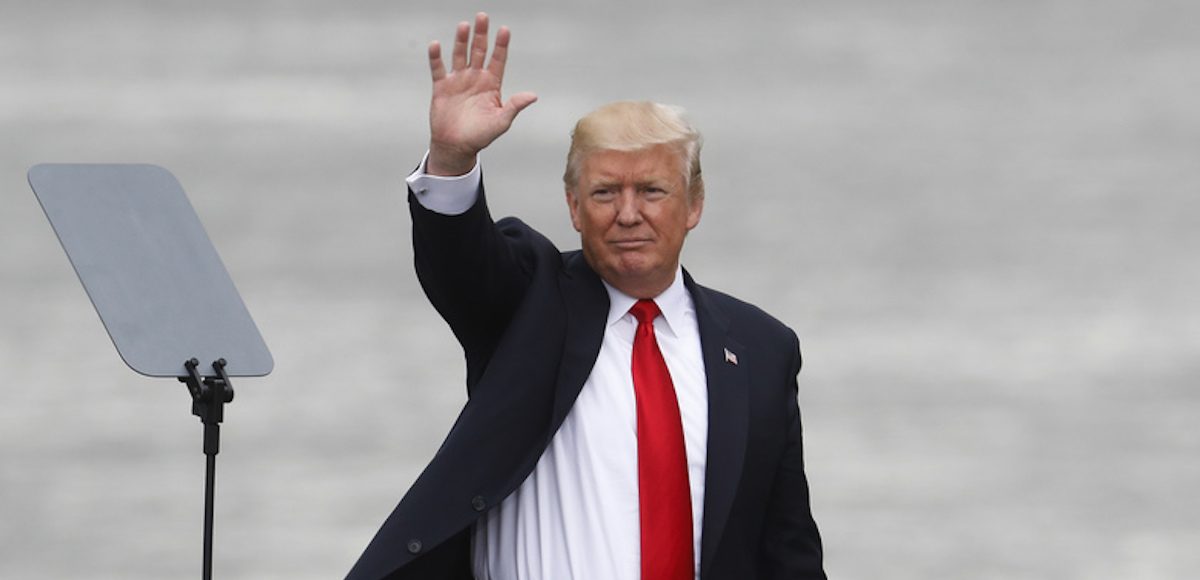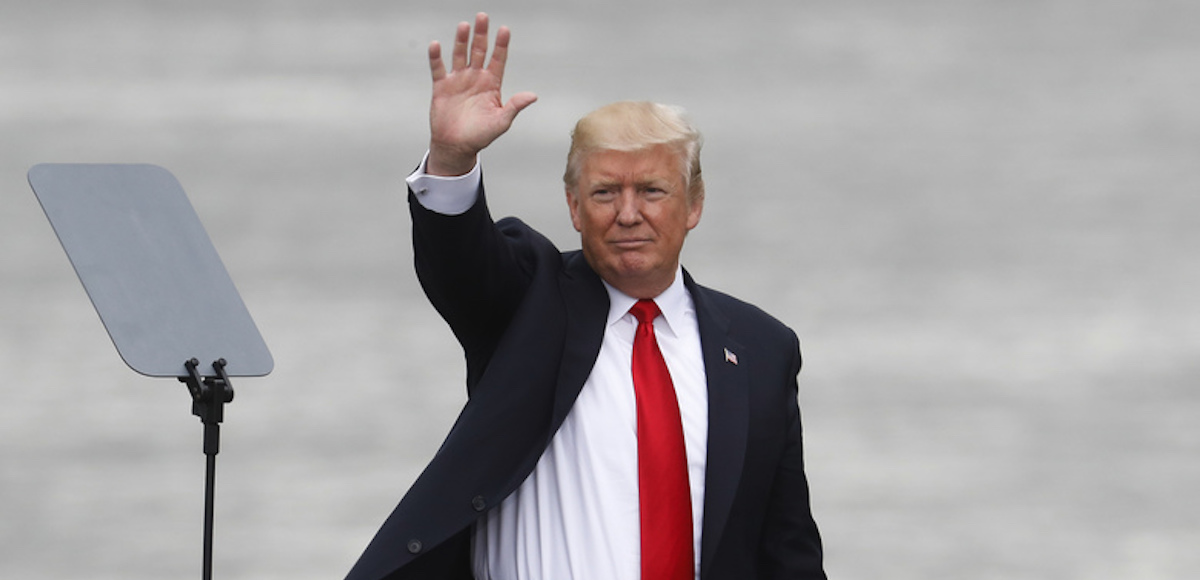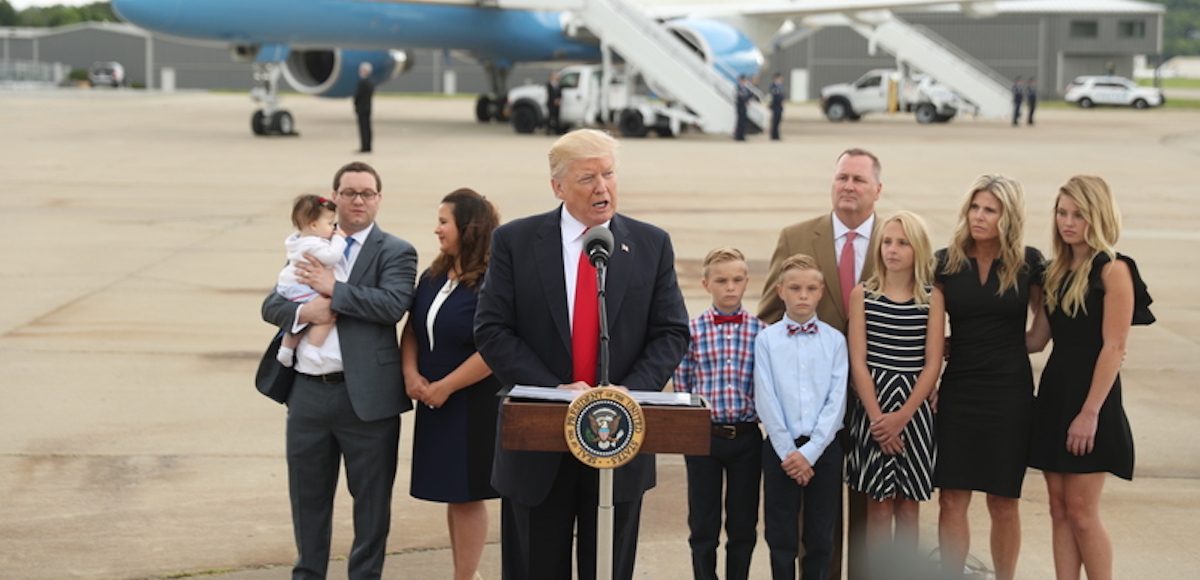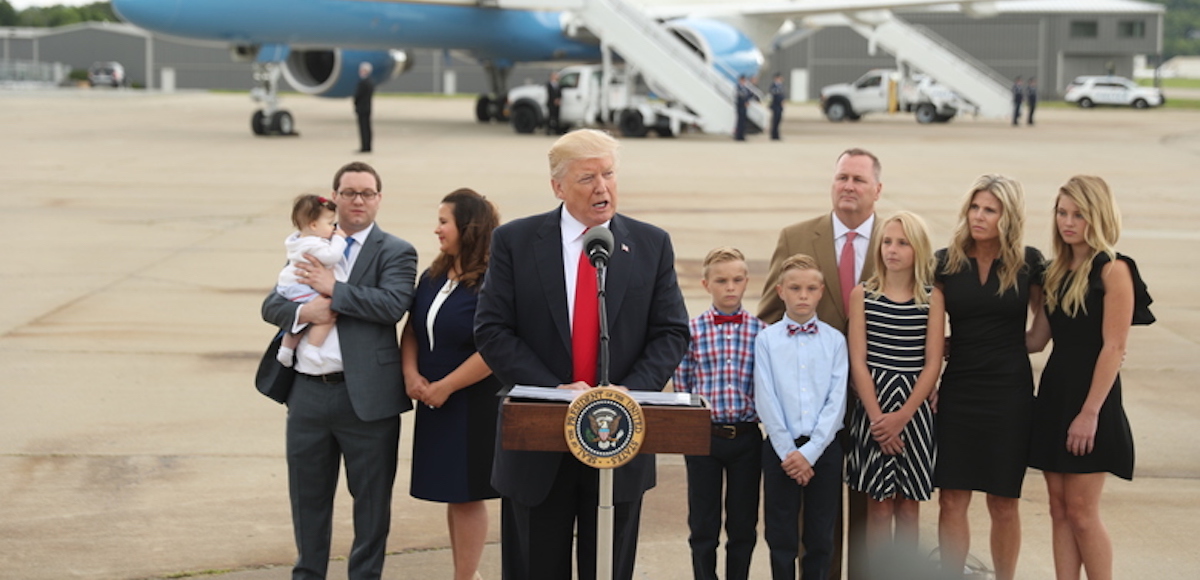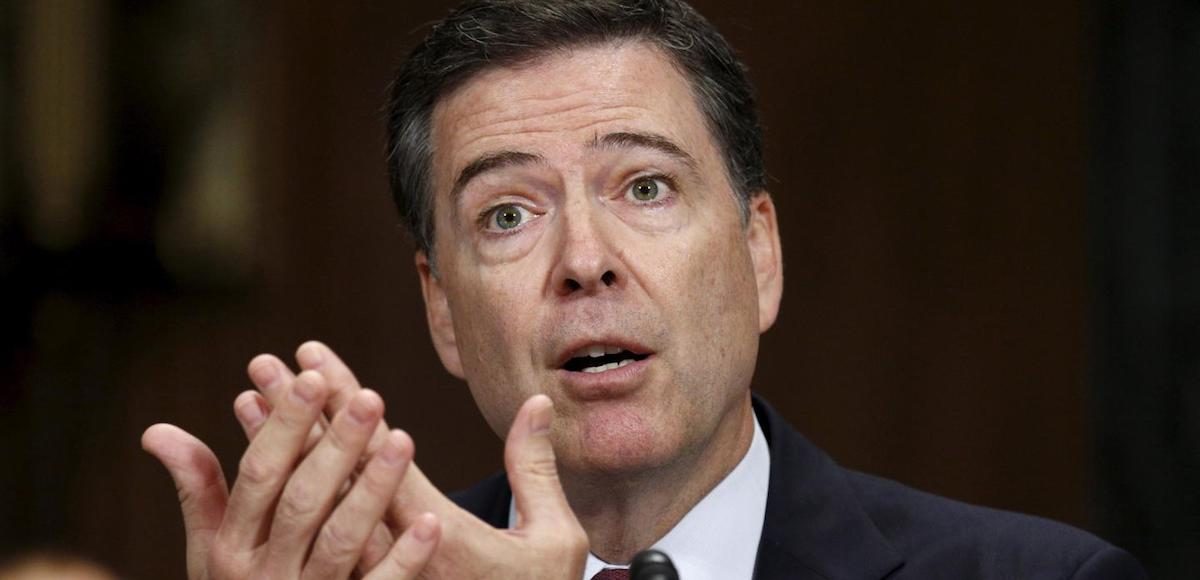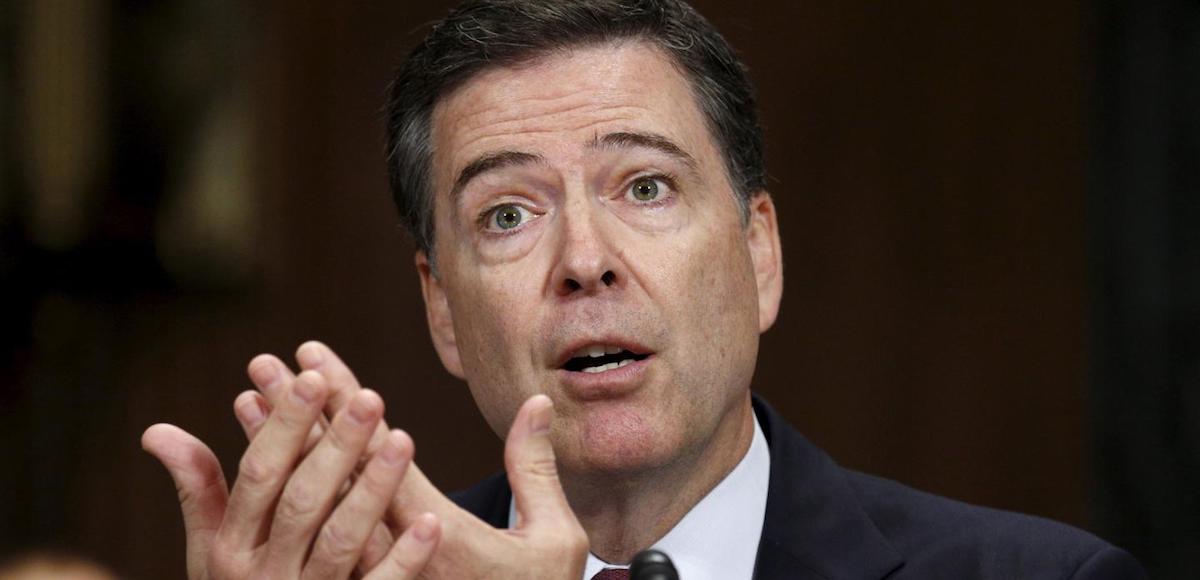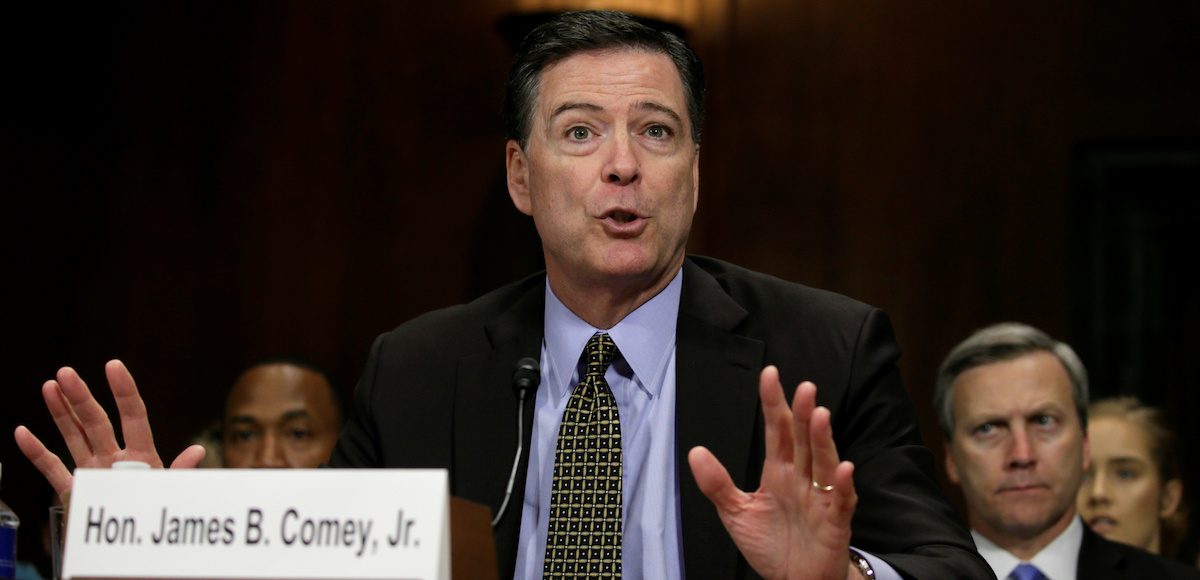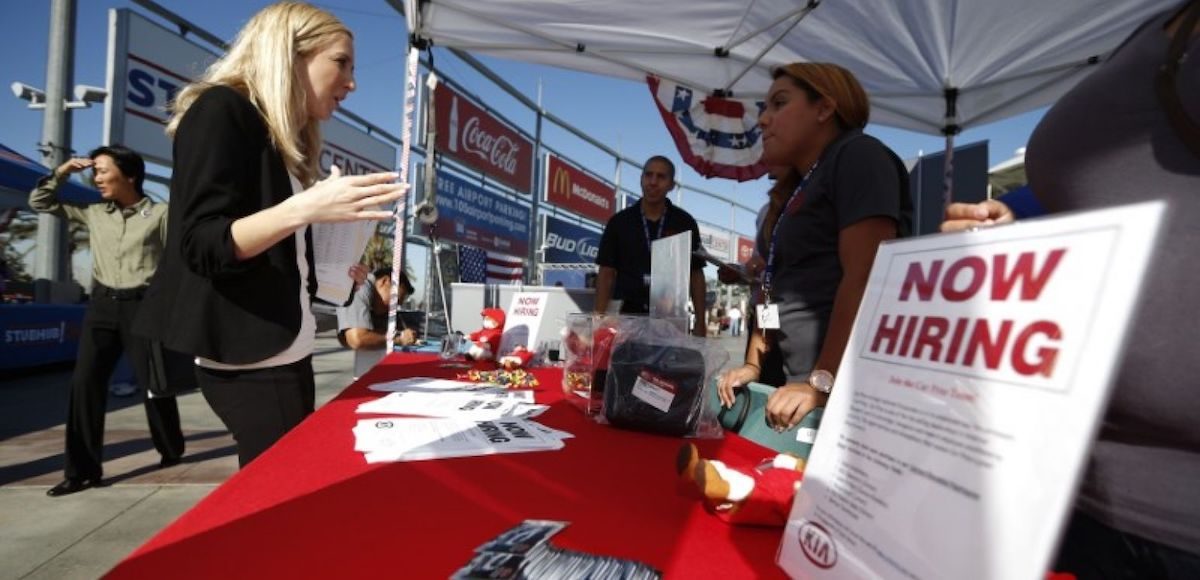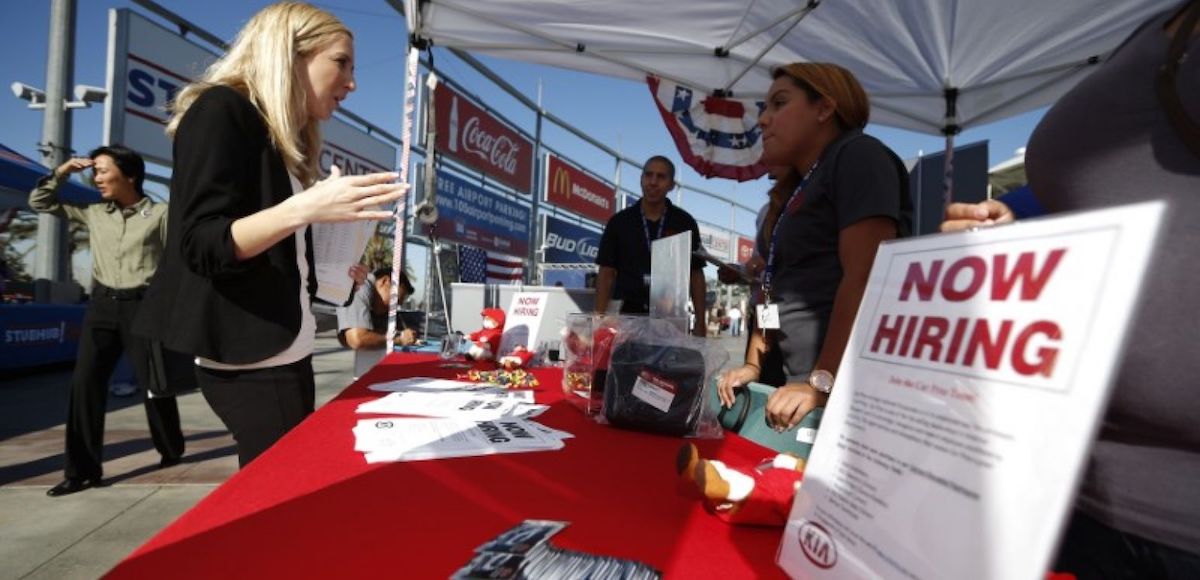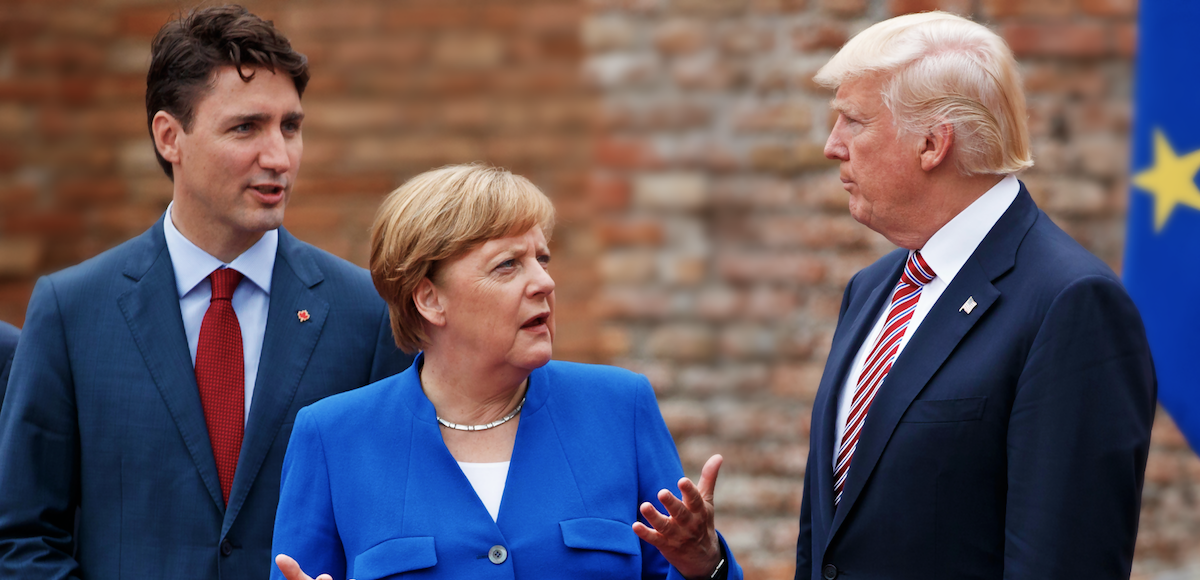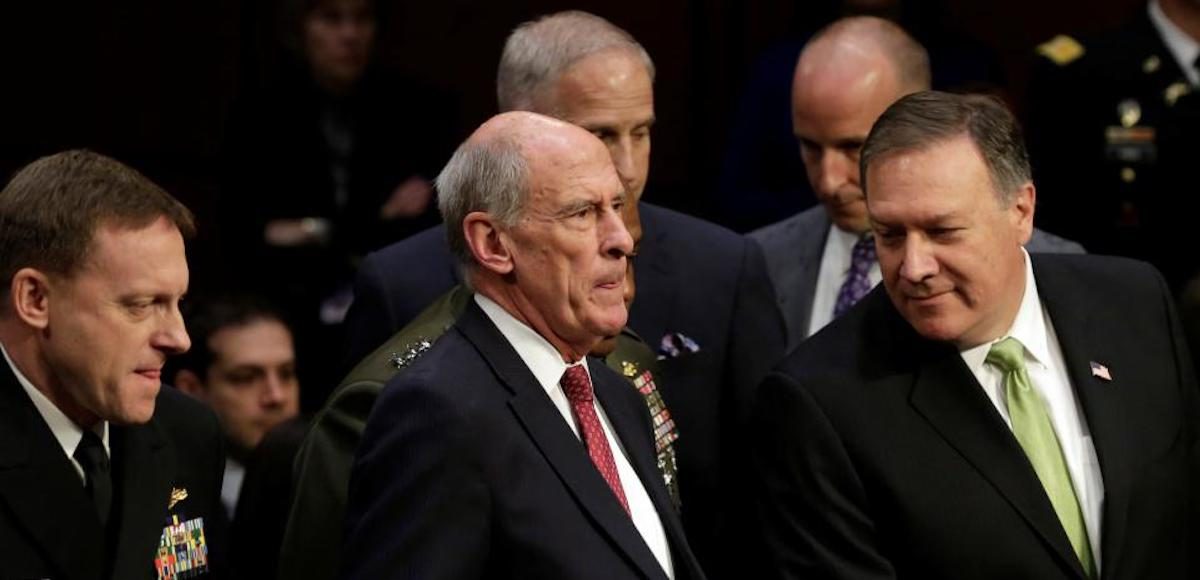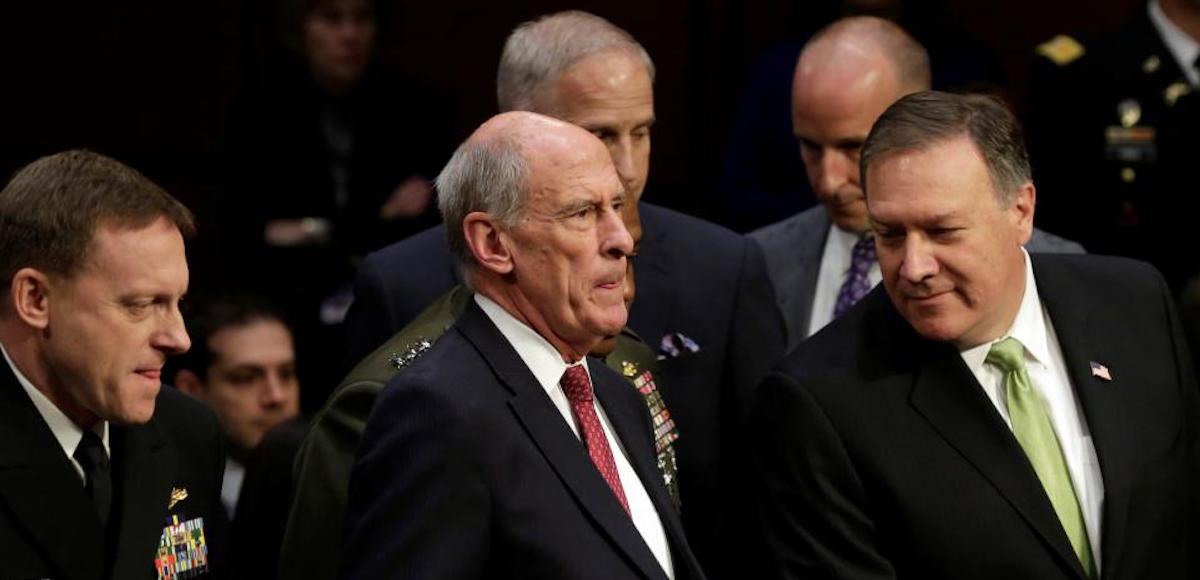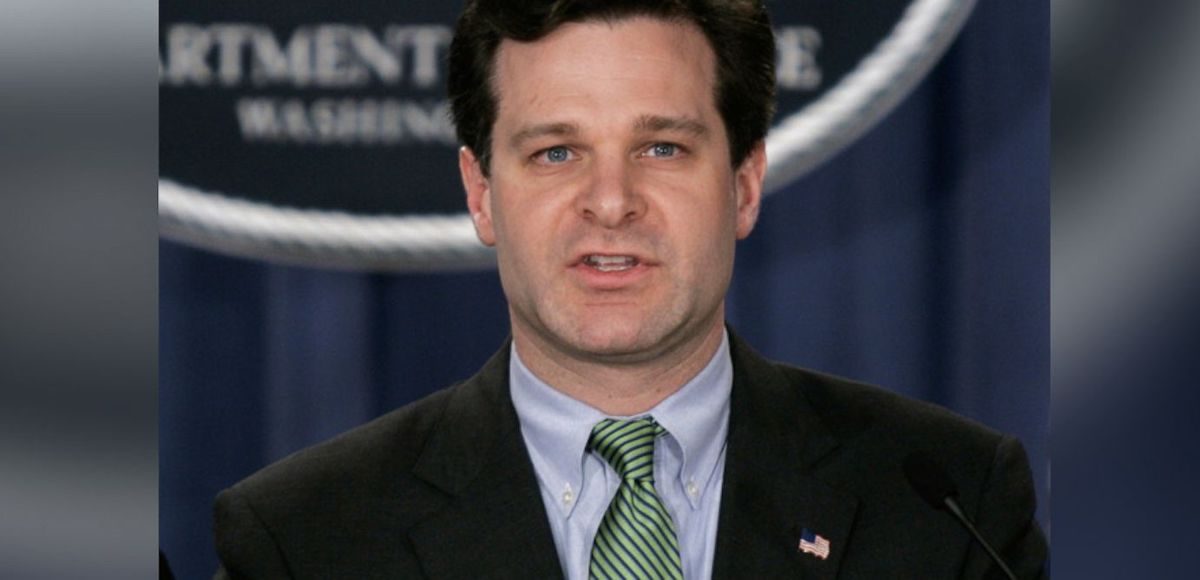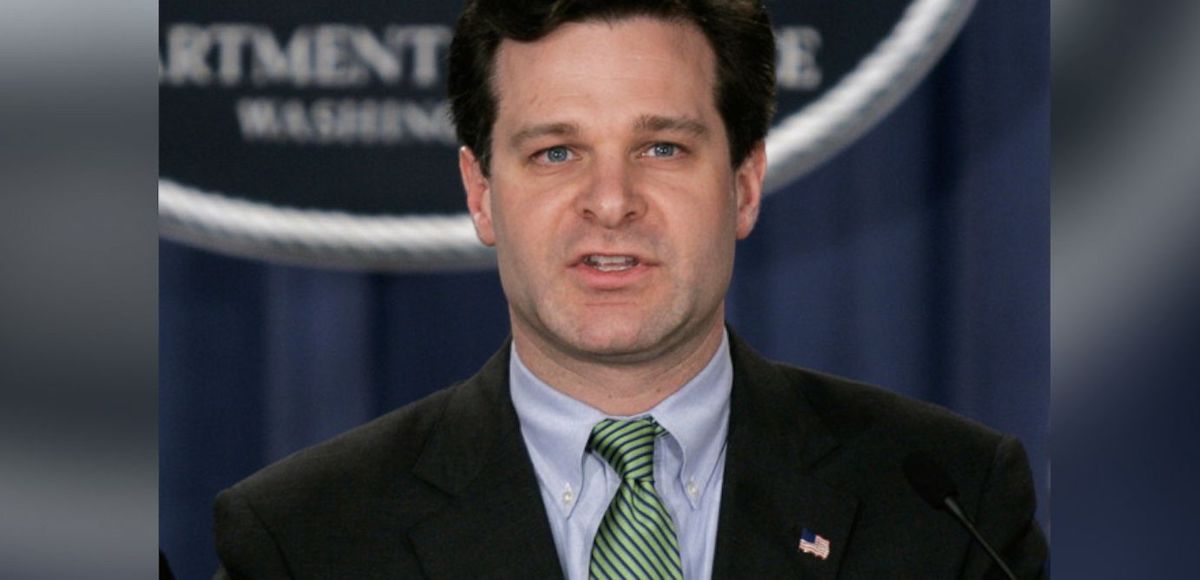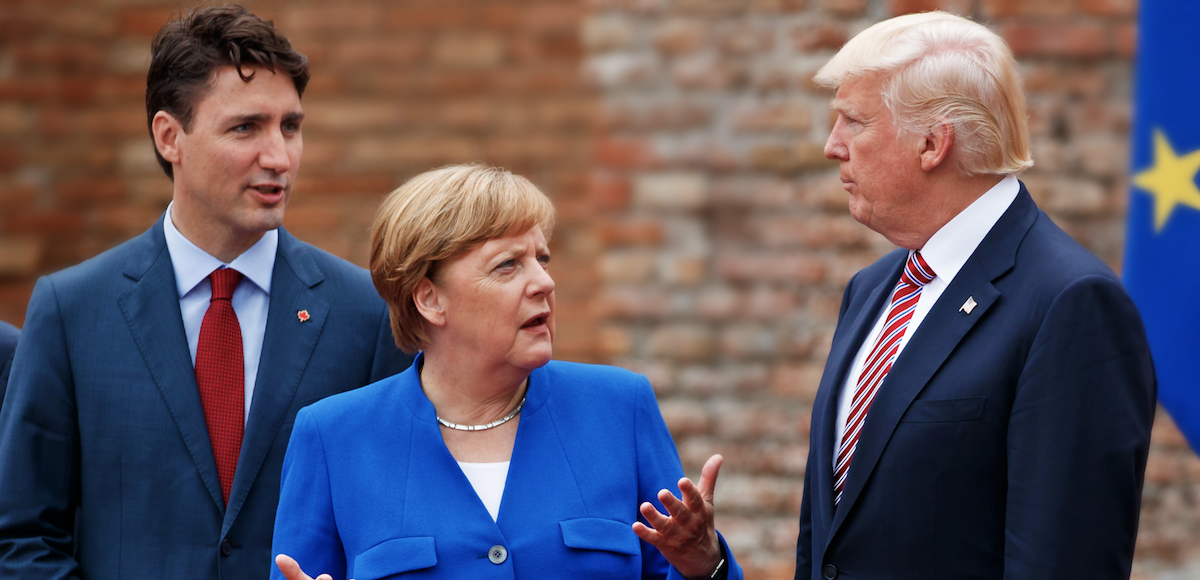
German Chancellor Angela Merkel, center, talks with Canadian Prime Minister Justin Trudeau, left, and President Donald Trump during a family photo with G7 leaders at the Ancient Greek Theater of Taormina during the G7 Summit, Friday, May 26, 2017, in Taormina, Italy. (Photo: AP)
In her 1984 historical treatise The March of Folly, the Jewish American author Barbara Tuchman defined “folly” as action taken by governments or historical figures that proved to be disastrous to their interests with the important caveat that an alternative course of action was not only available in hindsight, but also advocated for by well-known and respected parties BEFORE the disastrous course of action was embarked upon.
Ms. Tuchman analyzed several well-known historical events, starting with the (likely apocryphal) Trojan horse and ending up with the Vietnam War, which was still very fresh in her generation’s memory. Unfortunately, Ms. Tuchman passed away in 1989, but one can’t help but wonder what she would have thought about the march of folly in our times receiving a supercharger upgrade.
The past 100 years contain three seminal events that more than any other shape our world today: the two world wars and the creation of the State of Israel. These events send us two clear messages:
• The combination of a strong and big Germany and a weak and small Russia is extremely destabilizing.
• Migrants whose culture is the center of their universe do not assimilate.
Based on this experience, the correct course of action for the world and especially for Europe and the US to be taking would be resisting Germany’s bid to take over the European Union and terminating Western support for Eastern European and Baltic countries that for hundreds of years were parts of the Russian Empire. Additionally, the migration of Muslims to Europe and North America must be stopped. However, most European countries and the US are pursuing the exact opposite policies of strengthening Germany at the expense of Russia, encroaching on Russian interests in direct proximity to its already reduced borders, and allowing mass migration of Muslims to Western Europe and North America. These suicidal policies are pursued in spite of major voices on both sides of the Atlantic decrying their destructive nature and offering commonsense alternatives based on lessons from history. The twin policies of antagonism to Russia and open borders for Muslim migrants are pushing the world onto the brink of extreme instability, the kind of instability that had already resulted in two world wars. As such, they qualify for first prize (to date) in the human race’s march of folly, which is a sad accomplishment indeed.
In the following paragraphs the policies, their origins, and their likely consequences are analyzed in further detail.
Germany vs. Russia
God must have a keen sense of irony, because He placed the ambitious, industrious, and highly organized Germans on a small piece of land (140 thousand square miles compared to 3.8 million for the US and 6.6 million for Russia), while placing the somewhat lazy, romantic, and highly disorganized Russians on the biggest landmass any country has ever had. Perhaps Satan had something to do with this as well, because if there is one thing Germans have always been known for it is their aggression and their willingness to fight. The first time Germanic tribes appear in written history, it is in Julius Caesar’s Gallic Wars as the only warriors he was actually afraid of. He spends many paragraphs describing their military prowess and pretty soon they were the hired mercenaries of choice for the Roman Empire, fighting as far away from home as North Africa. The role of mercenary troops of choice was held by Germanic principalities from that time and through the unification of Germany in 1870, for a total of nearly two thousand years.
The kingdom of Muscovy, hidden as it was behind impenetrable forests did not have a major standing army until the end of the 17th century. Having overthrown their Mongol overlords a few centuries back, the Russians were not very keen on going to war with anyone in particular. It was the ascendance of the Germanic kingdom of Prussia and the territorial adventurism of Sweden that brought Tsar Peter I to realize that unless Russia developed a standing army capable of major overland maneuvers it would be conquered and subdued by either the Swedes or the Prussians. Peter accomplished this goal and in the Battle of Poltava in 1709 dealt such a decisive blow to Sweden so as to forever knock it out from the pages of history. Thus at the dawn of the 18th century Europe had three political entities capable of fielding major land forces: France, Prussia, and Russia.
The 18th century was hard on France; Louis XIV embroiled it in wars with the British in North America and with the Dutch (supported by the British) in today’s Holland and Belgium. Tremendous treasure was spent, but battlefield results were disastrous. French North America, stretching from Nova Scotia to Ontario and from Missouri to Maine was entirely lost and the Catholic French and Spanish forces in the Low Countries were defeated. Napoleon’s conquests in the first decade of the 19th century could be seen as a brief burst of a dying star, a flameout of historic proportions. By 1815 Napoleon was dying on St. Helena and France was falling into military and political irrelevance. Newly ascendant Prussia, on the verge of uniting all of Germany under its control and hungry for conquest attacked France in 1870 and utterly vanquished it. The fruits of the conquest however were meager; Germany could not bring itself to enslave the French people and steal lands that belonged to the French aristocracy; they were too much like them, too European. The German quest for lebensraum shifted eastward.
The self-evident imminent demise of the Austro-Hungarian and Ottoman empires in early 19th century meant that these huge landmasses, stretching across today’s Austria, Hungary, Romania, Bulgaria, and the rest of the Balkans were ripe for the picking. Germany was ready to pounce, its ambitions checked only by the sole remaining power capable of fielding a large land-based military force this side of the Atlantic: Russia. The Russian Empire was not industrializing as quickly as its Western European counterparts, but it was still a very formidable force. And it had designs of its own on the Balkans with their Slavic populations and in Turkey, where it felt that the time was ripe to finally fulfil its thousand-year dream of returning Constantinople (Istanbul) to Christendom and to the Greek Orthodox Church.
The stage was now set for a land grab competition between Germany and Russia in Eastern Europe with German victory far from certain. But Germany had an ace up its sleeve; for a number of decades now Russia had an escalating problem of anti-establishment domestic terrorism. Tsar Alexander II was assassinated and his son, Alexander III was the subject of a (just barely) failed assassination attempt in which Lenin’s older brother played a key role. Tremendous resources were expanded on battling this problem with many of the insurgent leaders, Lenin among them, finding sanctuary in the West. German intelligence was very active in supporting and funding the anti-Tsarist insurgency and when Russia, having suffered initial defeats was beginning to reassert itself on the Easter Front, they placed Lenin in a sealed railroad car and delivered him to the Finnish-Russian border, not far from the capital city of Petrograd (St. Petersburg). This gambit was successful beyond Germany’s dreams, having triggered a chain of events resulting in Russia’s pulling out of WWI in early 1918 by concluding a one-sided peace deal with Germany on terms that were very advantageous to the Germans.
But there was a more insidious and much longer lasting effect of the fall of the Russian Empire and its replacement by the Soviet Union. The Bolsheviks, true to their globalist and anti-Russian agenda granted autonomous status to various territories such the Ukraine that hitherto had been integral parts of Russia. In order to do that they needed to invent, from whole cloth, territorial boundaries that had never before existed. In so doing they built a delayed-action time bomb that finally detonated in 1990 with the fall of the Soviet Union and whose after-effects we are just now beginning to fully feel.
Having acted with extreme recklessness not once, but twice in the space of a few decades and causing unprecedented death and destruction across Europe, in the aftermath of WWII Germany became the beneficiary of enormous largesse by the US and its tax payers. However, as long as Germany was divided and the Soviet Union maintained a strong military presence on its eastern borders, it could not return to the domineering policies of its past. It was the fall of the Soviet Union, followed by the unification of Germany and further European integration under German leadership in the guise of the European Union that allowed Germany to resurrect its dreams of continental domination.
Germany’s vehicle of choice to achieve its goal is globalization and its various mechanisms. The reason for this is simple: Germany learned from experience that it cannot win when the US is on the opposite side. The instruments of globalization such NATO, the G6, the World Bank, and of course the European Union itself guarantee that unlike in the first two rounds, Round 3 of Germany vs. Russia will have the US in its corner. The EU under German leadership is faced with a Russia that is just turning the corner from being at its weakest point in over three centuries under the pro-Western leadership of Boris Yeltsin. Under Vladimir Putin, Russia is doing what all great powers do: asserting its power in its near abroad (now consisting of ex-Russian Empire territories and ex-Soviet republics) mostly via economic pressure, but also via military aid to sympathetically minded insurgencies. It is also rebuilding its military, with an emphasis on instruments of power projection, namely its nuclear triad, its navy, and its air force. Finally, it is protecting and strengthening its traditional Russian and Christian culture by actively resisting encroachment by pro-homosexual NGO’s and other Western groups that are being recruited by Russia’s Western enemies to undermine it from within.
Germany twice tried a recipe that brought it and the rest of the world untold suffering. In the nineteen tens and again in the nineteen thirties, perceiving that Russia was weakened, it launched a continent wide campaign of destabilization via the use of bribery and intimidation. During WWI and in the run-up to it, Germany used its agents to destabilize Balkan countries like Serbia and support the Bolshevik movement that finally toppled the Russian Empire. In the 1930’s it actively spread its fascist ideology, achieving great success in Italy, Japan, Romania, Hungary, and even Great Britain and the USA. In the USSR, it was only Stalin’s brutal and indiscriminate purges of 1937 – 1938 that suppressed any Nazi elements and sympathizers within the ranks of the Red Army and the ruling Communist Party.
In both world wars, Germany bid its time until it judged its destabilization campaign to have been sufficiently advanced, in some cases making preliminary moves to test the waters such the annexation of Austria and the Sudetenland in Czechoslovakia. Only when it judged the political landscape in Europe to have been sufficiently destabilized, did it strike for its main targets: Russia and Great Britain. Today, Germany is attempting to implement this strategy yet again, with a few adjustments. The current vehicle of choice for destabilization is mass Muslim migration. Not only did Angela Merkel admit over a million migrants to Germany, she is adamant about forcing this migration down the throats of all European nations. The resulting wave of terror in major European cities plays right into Germany’s hands, facilitating the achievement of its dream of European dominance.
Learning from two bitter defeats that conquering the Anglo-Saxons in England and across the pond in the US by force of arms is not possible, Germany has made tremendous strides in coopting both these countries to its cause, very nearly succeeding in this endeavor. Ratcheting up the economic pressure on Russia via the sanction regime, nudging the Baltic countries to adopt progressively more belligerent posture towards Russia, pushing NATO to deploy its troops (really, American troops) ever closer to the Russian borders, Merkel’s dream of finally making Germany into the dominant power she believes it to be is taking shape.
But recently, something snapped. It was these damn Anglo-Saxons again. First Britain voted to leave the German Empire, or as it is known today, the European Union, specifically to avoid allowing unlimited migration. Second, Eastern European countries, from Hungary to Poland to Slovenia, Slovakia, and the Czech Republic rebelled and refused to admit Muslim migrants. And finally, in a totally unpredicted and unpredictable fashion, America elected Trump president.
It is this latest setback that seems to drive Merkel batty. And with good reason. Trump’s election stiffens British resolve on Brexit and gives it a much stronger position in its divorce negotiations from the EU. It also puts winds in the sails of the smaller Eastern European nations, giving them hope that should Merkel expel them from the EU for their intransigence on the migrant issue, they will find a receptive audience in the Oval Office. In his dealings with NATO, Trump dared to demand that the country that foots most of the bill have not only the de jure, but also the de facto leadership role, redirecting its efforts away from Russia and towards the real threat to world peace – radical Islam. Trump omitted to commit the US to Article 5 in the NATO covenant, putting Merkel on notice that if she crosses the line and provokes Putin into a shooting war, it will be her own military, fed as it is with a meagre 1.2% of GDP, that will be facing the full brunt of Russia’s newly modernized forces unassisted. Trump has even dared to ask why manufacturing ball bearings in Germany was a wonderfully clean high technology, while manufacturing the same ball bearings in Ohio was old, dirty, and obsolete. Trump’s insistence on an American heavy manufacturing renaissance has the potential of dealing a deadly blow to Germany’s vaunted export economy.
These are perilous times. Merkel is feeling her project of German dominance over a subservient Europe from Portugal to the gates of Smolensk and from Bergen to Sicily slipping away. Her attempt at being the tail that wags the American dog is a non-starter as long as Trump is in office. Putin’s Russia is laughing off the sanction regime and Trump has no appetite to strengthen it further. Russia’s actions in taking Crimea, supporting the pro-Russian separatists in southeastern Ukraine, and placing medium range nuclear-capable Iskander missiles in its Kaliningrad enclave on Germany’s northeastern flank clearly signal an assertiveness not seen in over a generation. The trends are not in Germany’s favor. Next move is theirs; let us all hope that the third time around they will choose more wisely than the previous two.
Muslim Migration
I am a Jew. This self-identification is more fundamental to me than any piece of paper like my Israeli or American passports, more fundamental than my place of birth (Kiev, Ukraine, USSR), or my current place of residence (Halifax, Nova Scotia, Canada). What is a Jew (Hebrew: Yehudi)? Literally, someone from the Israelite tribe of Judah, which occupied the Judean hilltops around Jerusalem and Bethlehem from around the year 1,000 BC through about the 5th century AD and now occupies them again. How did I come to self-identify so strongly as a Jew while being born and spending my early childhood in the Ukraine? Because, my parents told me so, of course, but also because my family name was not Slavic, because my first name given to me after my grandfather who fell fighting the Nazis, was Hebrew (Baruch means “blessed” and is the first word in nearly all Jewish prayers), and finally because neither my teacher nor my classmates had any doubts about it. They all knew that I was not like them; I was not Ukrainian or Russian. I was a JEW.
Jews have been migrating out of Judea for economic reasons for centuries prior to the fall of Jerusalem to the Romans in 70 AD and the destruction of the Second Temple, but this trend accelerated after the disastrous Bar-Kochbah revolt in AD 150, when Romans renamed Judea Palestine to erase any memory of the rebellious province. Economic conditions plummeted and religious persecutions increased. By the fifth century Judea was substantially devoid of the people that gave her her name.
Migrating first to Italy and then to France and what today is Germany, Jews experienced severe religious persecutions which forced them ever eastward away from the rabidly anti-Jewish Catholic and Lutheran Churches of the West, and into the less-organized borderlands of Poland, Belarus, the Baltics, Romania, and the Ukraine, which is where I ended up being born. At any point in these migrations, throughout this nearly two thousand year history, my ancestors could have chosen to assimilate and leave the Jewish nation. Such a course of action, from Roman occupied Judea to the Soviet Union, would have afforded them many advantages in economic opportunity, social status, access to education, and may have even saved their lives. Many have chosen this path, among them the grandparents of the former secretary of state John Kerry, whose Jewish paternal grandparents decided that it would be more expedient to stop being Jews and converted to Catholicism taking at random the name of the Irish county Kerry as their surname. So I am the scion of over fifty generations of people who refused to assimilate even when doing so would have been extremely advantageous from every possible perspective, including staying alive.
This cultural identity was so amazingly strong that at the very first moment that Gentile control over Judea, the ancestral homeland of the Jews started to weaken in the waning days of the Ottoman Empire Jews organized a national revival movement called Zionism that within just over fifty years since its founding established, for the first time in over two thousand years an independent Jewish polity in the Land of Israel. My family lived in the Ukraine for centuries. We never once felt at home. Our home was and is in the narrow strip of land between the Jordan River and the Mediterranean Sea.
The Muslim migrants now flowing into Europe and North America are the most culturally misunderstood group of people that had ever existed. Their Western hosts look for their identity in their passports; Syrian, Libyan, Afghani. To the migrants themselves, these are foreign and meaningless constructs foisted on them by their French and English colonial masters. Not only are these markers meaningless to them, they are in fact hated and rejected. These migrants’ primary self-identification is their faith. They are Muslims and they belong to the Muslim Ummah the nation of Islam. Like Jews leaving Judea, they have no intention whatsoever of assimilating into their host societies. Unlike the Jews, they have every intention of assimilating their host societies to Islam.
Islam is the only one of the three Abrahamic religions that is still actively engaged in proselytizing; in Judaism this is simply forbidden and Christianity has substantially given up its expansionist attitudes. Islam, however, is as bent on spreading itself across the globe as it was at the time of its founding in the late 7th century. In addition to their proselytizing ardor, Muslim migrants, like many Muslims around the world are full of rage. They are angry that Muslim majority countries lead the world in every negative metric such as violence, corruption, and human rights, while trailing at the very back of the pack in all positive metrics such as education, scientific development, economic development, standard of living, life expectancy etc. Israel, a country with virtually no natural resources has a nominal per capita GDP that is nearly twice that of Saudi Arabia and eight times that of Iran with their vast oil revenues (roughly $40, 000 vs. $20,000, and $5,000). Muslim countries that do not have oil reserves fare much worse with per capita GDP hovering around $2,000.
The undeniable correlation between Islam, violence, and backwardness has not escaped the attention of courageous Muslims academics and journalists. The reasons for it are certainly in dispute, but the fact of its existence is there for all to see. Many Muslims actively blame the West, starting with the crusades (11th to 13th centuries!) for Islam’s woes, setting them on the path of hatred and retribution against all Western nations. As a result, Western societies are inviting into their midst significant numbers of people who are culturally cohesive, have no intention of assimilation (even outwardly), are intent on proselytizing, and are full of rage against their hosts.
This already glum picture grows even darker when we take into account the cultural holocaust perpetrated by the West against its own people. Western culture, intertwined as it is with Christianity has been banned from nearly all educational institutions. Western classics are not taught, Western art is not put in its historical context. The greatest Western endeavors of exploration and conquest are vilified as acts of genocide. Traveling in Europe, I have often encountered groups of school children visiting the soaring cathedrals built by their ancestors. They gaze at the wonderful frescoes of Madonna and Child with unfeeling eyes, their teacher saying nothing.
The Talmud has a famous parable of the two carts, one full, one empty, meeting each other head on on a one-lane bridge. Clearly, the Sages say, the empty cart must give way to the full one. Over the past 70 years, ever since the end of WWII, the West has been busy emptying its cart with remarkable success and it is now finally empty. Birth rates among whites in the West are plummeting because when you have nothing positive to tell your children about the exploits of their ancestors, why have children in the first place? By inviting into its midst millions of people whose cultural cart is full to overflowing and who bear it and an extreme grudge, the West is committing an act of communal suicide.
History teaches us that relying on economic benefits to assimilate other cultures is simply a folly. Had that approach worked, I would have been born a Ukrainian rather than a Jew, and my life would have been much poorer for it. I owe a tremendous debt of gratitude to my countless ancestors who, unlike John Kerry’s grandparents, eschewed the way of expediency for the way of loyalty; loyalty to their won ancestors, their culture, their tribe, and their religion. Let us not fool ourselves that economic enticements of any kind will help assimilate the Muslim migrants. We can clearly observe that the opposite is happening; second and third generations, while much more financially secure, are also much more prone to reject their host culture whole cloth. If there is one lesson to be learned from the miraculous return of the Jewish people to its homeland after nearly two millennia of diaspora, it is that culture always wins over riches.
It is the tragedy of our times that the West has been hijacked by a small oligarchy of globalists a la Frau Merkel and Mr. Obama whose naked greed and ambition know no bounds and who are actively inimical to Western culture and Western interests. They are busy actively ignoring the lessons of history as reflected in Germany’s reckless adventurism and cultural self-immolation. The reaction to their suicidal leadership is so far found in the sixty plus million regular Americans who voted for Mr. Trump and the sixteen million British citizens who voted for Brexit. It is a paltry opposition compared to the nearly limitless resources of the globalist elites. The fate of the world hangs in balance.
